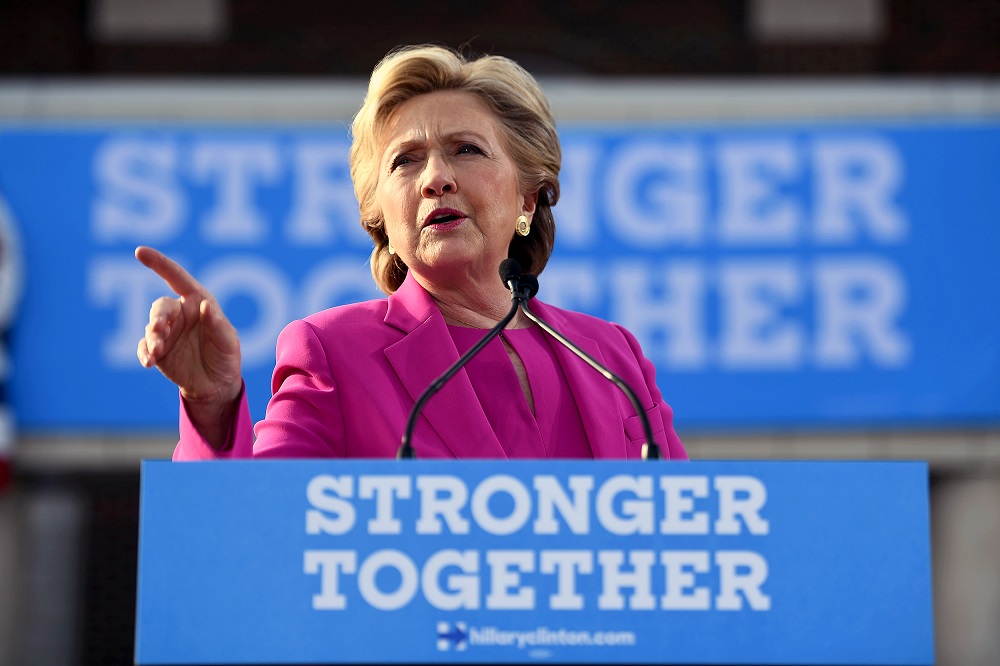
OPINION: This article contains commentary which may reflect the author’s opinion
In a filing by Special Counsel John Durham, lawyers for the Clinton campaign agreed to pay a technology company to breach servers owned by Trump Tower and later the White House in order to establish an “inference” and “narrative” that would link Donald Trump to Russia.
A motion filed by Durham on Feb. 11 addressed potential conflicts of interest associated with its representation of Michael Sussmann. Sussmann has been charged with making a false statement to a federal agent. He has pleaded not guilty to the charges.
The indictment against Sussmann claims that, less than two months before the 2016 presidential election, he informed FBI general counsel James Baker that he was not working for any client when he requested and held a meeting in which he presented alleged “data and documents” that allegedly demonstrated a covert communication channel between the Trump Organization and Alfa Bank, which has ties to the Kremlin.
But Durham’s Feb. 11 filing shows that Sussmann “had assembled and conveyed the allegations to the FBI on behalf of at least two specific clients, including a technology executive (Tech Executive 1) at a U.S.-based internet company (Internet Company 1) and the Clinton campaign.”
According to Durham’s filing, Sussmann’s “billing records reflect” that he “repeatedly billed the Clinton Campaign for his work on the Russian Bank-1 allegations.”
The filing confirmed that Sussmann met the Tech Executive and communicated with another law partner, who worked for the Clinton campaign. Sources say that that lawyer is Marc Elias, who was employed by the law firm Perkins Coie.
In Durham’s filing, it is stated that the tech executive worked with Sussmann, an investigation firm hired by Law Firm 1 as the agent of Clinton, a number of cyber analysts, and a number of employees from multiple internet companies to “assemble the purported data and white papers.”
“In connection with these efforts, Tech Executive-1 exploited his access to non-public and/or proprietary Internet data,” according to the filing. “Tech Executive-1 also enlisted the assistance of researchers at a U.S.-based university who were receiving and analyzing large amounts of Internet data in connection with a pending federal government cybersecurity research contract.”
“Tech Executive-1 tasked these researchers to mine Internet data to establish ‘an inference’ and ‘narrative’ tying then-candidate Trump to Russia,” Durham explains. “In doing so, Tech Executive-1 indicated that he was seeking to please certain ‘VIPs,’ referring to individuals at Law Firm-1 and the Clinton campaign.”
Durham also asserts that at Sussmann’s trial, the government will establish that one of the data sets Tech Executive-1 accessed consisted of domain name system (DNS) internet traffic relating to “(i) a particular healthcare provider, (ii) Trump Tower, (iii) Donald Trump’s Central Park West apartment building, and (iv) the Executive Office of the President of the United States (EOP).”
In his report, Durham notes that Tech Executive-1’s internet company “had come to access and maintain dedicated servers” dedicated to the Executive Office of the President as “part of a sensitive arrangement whereby it provided DNS resolution services to the EOP.”
“Tech Executive-1 and his associates exploited this arrangement by mining the EOP’s DNS traffic and other data for the purpose of gathering derogatory information about Donald Trump,” Durham writes.
According to the filing, Sussmann also provided “an updated set of allegations” which included the Russian bank data, as well as several additional allegations regarding Donald Trump, “to a second agency of the U.S. government” back in 2017.
Durham asserts the charges “relied, in part, on the purported DNS traffic” which Tech Executive-1 and others “had assembled pertaining to Trump Tower, Donald Trump’s New York City apartment building, the EOP, and the aforementioned healthcare provider.”
When Sussmann met with the second government agency, Durham asserts he “provided data which he claimed reflected purportedly suspicious DNS lookups by these entities of internet protocol (IP) addresses affiliated with a Russian mobile phone provider,” and claimed that the lookups “demonstrated Trump and/or his associates were using supposedly rare, Russian-made wireless phones in the vicinity of the White House and other locations.”
“The Special Counsel’s Office has identified no support for these allegations,” Durham wrote, adding that the “lookups were far from rare in the United States.”
“For example, the more complete data that Tech Executive-1 and his associates gathered–but did not provide to Agency 2–reflected that between approximately 2014 and 2017, there were a total of more than 3 million lookups of Russian Phone-Prover 1 IP addresses that originated with U.S.-based IP addresses,” Durham stated. “Fewer than 1,000 of these lookups originated with IP addresses affiliated with Trump Tower.”
Moreover, data collected by Tech Executive-1 also showed that lookups began in 2014, during the Obama administration and years before Trump was inaugurated, which Durham described as “another fact which the allegations omitted.”
“In his meeting with Agency-2 employees, the defendant also made a substantially similar false statement as he made to the FBI General Counsel,” Durham noted. “In particular, the defendant asserted that he was not representing a particular client in conveying the above allegations.”
“In truth and in fact, the defendant was representing Tech Executive-1–a fact the defendant subsequently acknowledged under oath in December 2017 testimony before Congress, without identifying the client by name.”
In a statement on Saturday evening, Trump said Durham’s filing “provides indisputable evidence that my campaign and presidency were spied on by operatives paid by the Hillary Clinton Campaign in an effort to develop a completely fabricated connection to Russia.”
“This is a scandal far greater in scope and magnitude than Watergate and those who were involved in and knew about this spying operation should be subject to criminal prosecution,” Trump added. “In a stronger period of time in our country, this crime would have been punishable by death.”
Trump continued: “In addition, reparations should be paid to those in our country who have been damaged by this.”
Source: The Republic Brief